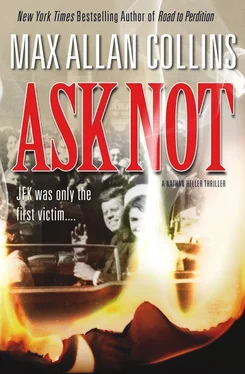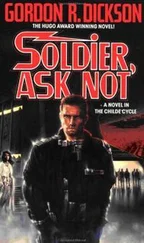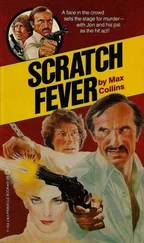What lived up to expectations was Captain Clint Peoples himself, a rangy hombre in his fifties with dark graying hair in a military-short cut and a ready smile that didn’t keep me from noticing that those steady blue eyes didn’t blink much. One of the two rooms was his, half as big as the bullpen shared by nine two-man desks, counting his secretary’s just outside his office door. About eleven Rangers in plainclothes were making phone calls, typing reports. This might have been the bustling bullpen of a precinct house in Manhattan, except for the drawls.
Right now we were shut inside the captain’s office, the door muffling but not defeating the bullpen clamor. With his back to a scarred old rolltop desk shoved against the wall, Peoples sat facing me in a visitor’s chair. There wasn’t much else to the room except a quartet of metal filing cabinets and a bulletin board of WANTED posters. No framed photos or citations on the cracked-plaster walls, despite this man being a celebrated lawman, veteran of countless arrests leading to convictions, and shoot-outs leading to dead perps.
A window air conditioner chugged in this room, as did one in the outer room. It was ninety degrees outside, and humid, and if this was fall in Waco, I wasn’t anxious to summer here. The heat hadn’t taken a toll on me, though, as I’d moved rapidly from an air-conditioned car into the cooled building. I was casual in a yellow Ban-Lon and a lightweight brown H.I.S. suit, the coat of which my host had already invited me to hang on the coat tree in the corner, where his own jacket and a multi-gallon Stetson worthy of a Texas Ranger already resided.
Like his Rangers, he wore street clothes — a short-sleeve white shirt with dark-brown tie, cowboy boots glimpsed under tan chino trousers; but a small gold CAPTAIN badge was pinned just above his breast pocket. A.45 automatic with fancy ironwood grips rode high on his right hip, and he was smoking a cigar, a big one. The air conditioner cut the smokiness in the air, and anyway it was a good cigar, so I wasn’t bothered.
We had already gone through with the handshaking ritual, and his secretary, Ruth, delivered us both cold bottles of Dr Pepper (“The native drink,” Peoples said). It was just after two o’clock in the afternoon, after I’d driven down in my rental Galaxie from Dallas, where American Airlines had deposited me around eleven. I’d checked into the Statler Hilton, freshened up, and made the ninety-minute drive to Waco on Highway 77. The ride had been surprisingly rolling and green, Waco itself a modern city dropped into a big bowl formed by low hills. An ancient suspension bridge bisected the town, taking me over the muddy Brazos at South First Street and Austin Avenue.
“I appreciate you seeing me at such short notice, Captain,” I said.
“That was some high-powered advance scout you sent lookin’ for me,” he said, blowing out a little smoke signal of cigar smoke, his eyes amused.
“It was nice of Senator McClellan to make that call,” I said.
“Impressive, you workin’ for him and Bobby Kennedy on that rackets committee.”
“More impressive if we’d sent Hoffa to jail.”
He nodded, smile fading. “Now and then a big one gets away,” he said, as much to himself as to me. Then his smile returned. “But the senator is one of the good ones. He tried damn near as hard as we did to put a certain party away.”
“What party is that?”
His smile turned sly and he rolled the big cigar around in it as he rocked. “We’ll get to that. We’ll get to that. Mr. Heller, what do you know about the Texas Rangers?”
“Pretty much what I’ve seen in the movies and on TV. Which I figure is about as accurate as what you’ve seen about private detectives.”
He let out a laugh. “We’re not a Wild West show anymore, Mr. Heller. We’re with the Department of Public Safety — us and the Highway Patrol and licensing bureaus and so on. We’re essentially the state’s detective division — we help out sheriffs and police departments, if investigatin’ a major crime is beyond their means. And of course we handle fugitive apprehension, since a fleein’ felon doesn’t confine himself to county and city boundaries. Roadblocks, aerial reconnaissance, all your standard modern police methods.”
“What, no horses?”
“Oh, we still have horses, Mr. Heller. There are lots of places left in Texas where it takes a horse to get there.” He shifted in the chair. “I do apologize for these cramped quarters. When I spoke of ‘modern police methods,’ I was definitely not referrin’ to these sloppy surroundings.”
“Are they temporary?” It had that feel.
“They are now.” He shrugged and puffed cigar smoke. “When Company F got relocated to Waco, a few years back, all we got was these couple of rented rooms, some cast-off office furniture, and a cleaning crew that comes in once a month, if the mood strikes ’em.”
I jerked a thumb toward the street. “You know, this looks like a nice place to live, college town, trees along the river — lots of industry, I understand. Must be close to a hundred-thousand population.”
“Not quite yet. Gettin’ there.”
“So why does your downtown look like East Berlin? This building included.”
He half-turned to tamp cigar ash into a glass tray on his desktop. “That’s a sad one, Mr. Heller. Terrible tornado blew through here in ’53, right down the middle of town. Killed well over a hundred. Chewed up hundreds of buildings and spit ’em out. This downtown was one of the main casualties.”
“Well, they obviously rebuilt it.”
“Some of it. Some they never got around to. And in the meantime a new shopping center went in. That killed the downtown deader than the tornado.”
“That’s happening places where there hasn’t been a tornado. But Waco’s disaster was ten years ago — what makes these quarters ‘temporary’ now?”
He grinned. Those blue eyes even granted me a blink. “Remember how you got here, Mr. Heller? How you made your way back to us through the driver’s license testing area, and those offices with pretty young girls and callow young men in them?”
“I believe my memory goes back that far.”
“Well, we took to walkin’ various suspects through there for questioning back here in No Man’s Land. On a fairly regular basis, we rounded up some fairly unsavory types, on prostitution and vagrancy and drug dealing and such like.”
“Ah,” I said.
“I’d already been hounding the Powers That Be about the need for a separate facility for Company F’s Rangers. And I have a few influential friends in the community, including a former mayor or two and assorted Chamber of Commerce folk.”
“So when do they break ground?”
He grinned around the cigar again and his eyebrows flicked up. “Next May, Mr. Heller. Next May. Now, you didn’t come all this way to hear about my problems — at least not my problems with these cramped quarters.”
“No.” I sipped Dr Pepper. Not bad for a regional drink. “I’m told, by Senator McClellan among others, that you’re the man to talk to about the Henry Marshall ‘suicide.’”
“It’s an interesting story, Mr. Heller.” He wasn’t rocking. “And I would be glad to tell it. But there’s another story — at least as interesting as that one — that you really should hear first.”
“By all means,” I said.
Let me tell you about another Texas boy, Mr. Heller. Born in Mount Pleasant, Texas, back in 1921. Name of Malcolm Wallace, “Mac” to most. His daddy was a hardworking man, a farmer who later signed onto road crews, and he must have been proud of his boy, making good grades and keeping out of trouble.
By high school, Mac stood a broad-shouldered six foot, and kept right on pulling down high marks, and was popular enough to get elected vice president of his senior class. Something of a football star, too, till he hurt his back and had to quit. After he graduated high school, the boy joined the Marines, this was before the war, around ’39... oh, you were in the Marines, too, Mr. Heller? I was a bit too old to serve myself, I’m afraid.
Читать дальше












